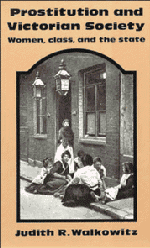Book contents
- Frontmatter
- Contents
- Preface
- Introduction: The Revolt of the Women
- Part I Prostitution, Social Science, and Venereal Disease
- Part II The Contagious Diseases Acts, Regulationists, and Repealers
- Part III Two Case Studies: Plymouth and Southampton Under the Contagious Diseases Acts
- Epilog
- Notes
- Selected Bibliography
- Index
Introduction: The Revolt of the Women
Published online by Cambridge University Press: 01 June 2011
- Frontmatter
- Contents
- Preface
- Introduction: The Revolt of the Women
- Part I Prostitution, Social Science, and Venereal Disease
- Part II The Contagious Diseases Acts, Regulationists, and Repealers
- Part III Two Case Studies: Plymouth and Southampton Under the Contagious Diseases Acts
- Epilog
- Notes
- Selected Bibliography
- Index
Summary
In 1864, Parliament passed the first of three statutes providing for the sanitary inspection of prostitutes in specific military depots in southern England and Ireland. Initially this first Contagious Diseases Act, as it was obliquely entitled, aroused little attention inside or outside governmental circles. Florence Nightingale had objected to its passage, on the grounds that it officially sanctioned “vice,” but she failed to convince politicians like William Gladstone that a standing army could be a “moral institution.” Public opposition to regulation did, however, surface in the 1870s, when a coalition of middle-class nonconformists, feminists, and radical workingmen challenged the acts as immoral and unconstitutional, and called for their repeal. The participation of middle-class women in repeal efforts fascinated and shocked many contemporary observers, who regarded this female rebellion as an ominous sign of the times. One troubled member of Parliament was moved to remark to Josephine Butler, the feminist repeal leader, “We know how to manage any other opposition in the House or in the country, but this is very awkward for us – this revolt of the women. It is quite a new thing; what are we to do with such an opposition as this?”
The public controversy surrounding the Contagious Diseases Acts constitutes a fascinating chapter in the history of class and gender relations in mid-Victorian Britain. This book looks at the origins of these acts, the successful feminist campaign to repeal them, and their impact on registered prostitutes and their community.
- Type
- Chapter
- Information
- Prostitution and Victorian SocietyWomen, Class, and the State, pp. 1 - 10Publisher: Cambridge University PressPrint publication year: 1980



